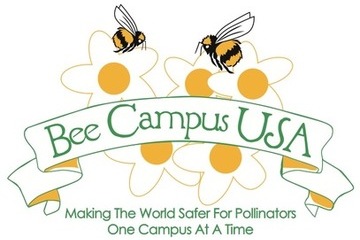
03/20/2018
SUNY Cortland’s commitment to sustainability extends beyond using 100 percent renewable energy and constructing buildings to the highest green standards.
The College also is friendly to its bees.
SUNY Cortland was recently renewed as one of 34 Bee Campus USA sites by Bee City USA, a national organization dedicated to raising awareness about natural pollinators, like bees. The College was one of the first in the nation to earn the designation when the program began in 2016. Vassar College in Poughkeepsie is the only other Bee Campus in New York state.
The world’s bee population has been in decline, causing great concern because the pollination they make possible is vital to plants’ ability to reproduce. Failing pollination could endanger the planet’s food supply.
“Bees are having a tough time, as well as some other pollinator species,” said Beth Klein, campus sustainability coordinator and professor of childhood/early childhood education. “We rely on them to help us get our fruits and vegetables.”
SUNY Cortland students can learn about the plight of pollinators next week when Greenflix, the documentary film series sponsored by the College Green Reps, will screen “Vanishing of the Bees.” A free viewing of the film is scheduled for Monday, April 2 at 7 p.m. in Moffett Center, Room 2125. Narrated by actress Ellen Page, the documentary addresses the causes of colony collapse disorder, which is damaging the world’s bee population.
To earn the certification, colleges must do much more than raise awareness. They must manage campus environments with landscapes that encourage bee foraging and nesting and recognize the importance of pollination in sustaining agriculture and natural habitats.
“It’s an indication of the care, particularly that our grounds folks take, that they’re not doing things that would interfere with pollinator species,” Klein said. “We’re lucky with the support we’ve gotten from (Lecturer) Mike Hough in the Biological Sciences Department in his help in putting native plants in the bioswales.”
SUNY Cortland has made hundreds of plantings of at least 26 different native plant species since first receiving Bee Campus USA certification in 2016. Hough has published a guide to local pollinator-friendly plants with a list of local nurseries where members of the community may purchase seeds. Signs that describe native plants and the pollinators they attract have been placed near the educational bioswale next to Bowers Hall. A bioswale is a plant-covered depression that collects storm water runoff and filters pollutants.
A least-toxic integrated pest management plan is followed by the College’s Grounds Services crews. It establishes a sustainable approach to managing pests by combining biological, cultural, physical and chemical tools in a way that minimizes economic, health and environmental risks.
In recent years, SUNY Cortland has hosted a native plant fair, a workshop on caterpillar gardening and a talk on milkweed pollination to help educate the campus community about pollinator health and habitat. The Biological Sciences Department focused its conservation biology seminar on pollination biology.
SUNY Cortland’s Garden Advisory Committee creates and maintains gardens on campus and coordinates the College’s Bee Campus USA activities. An undergraduate student has served as Bee Campus USA’s service-learning intern, and other students have used model urban gardens to research the impacts of organic vegetable gardening.
The College detailed its efforts toward protecting and enhancing pollinator habitats in its 2017 annual report.
The College is planning more events throughout April as part of Sustainability Month. For more information, contact Klein at 607-753-5682.